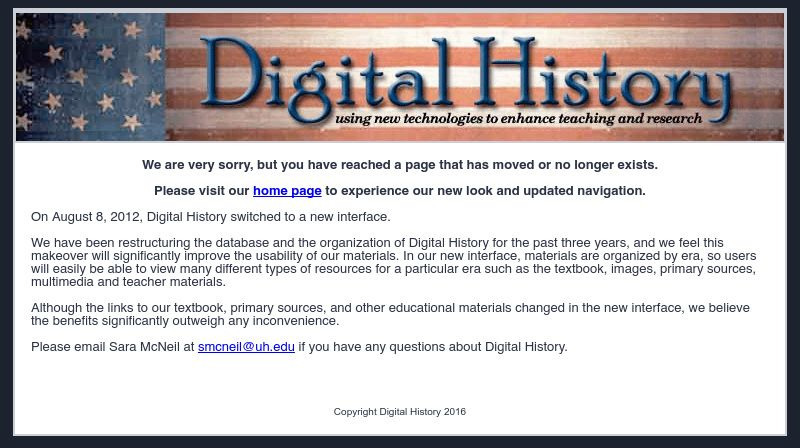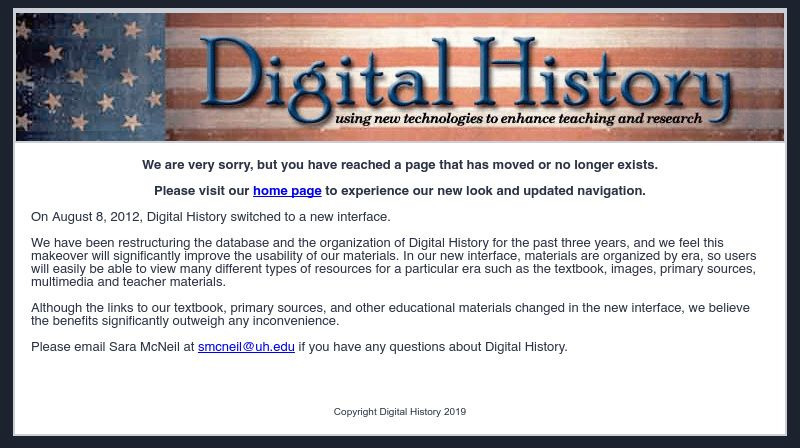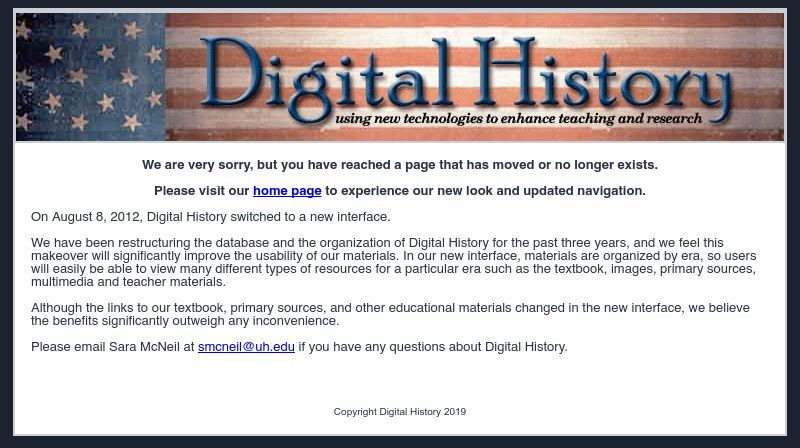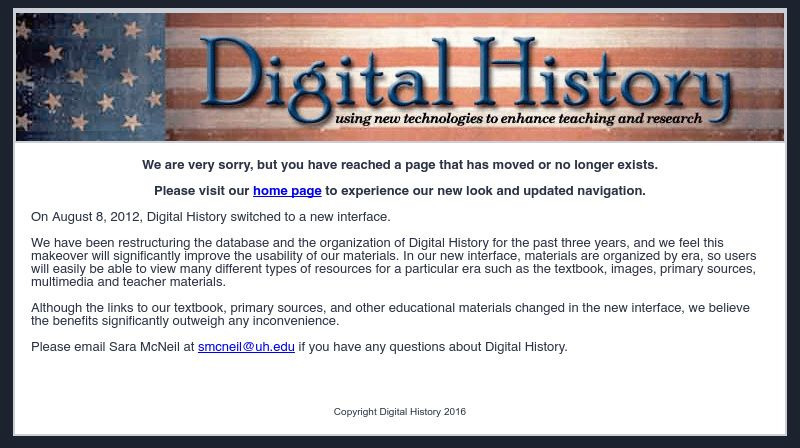Digital History
Digital History: Explorations: Indian Removal
In this exploration, students will examine the federal policy toward American Indians, why President Jackson introduced the Indian Removal Policy, Native American resistance to removal, and the human meaning of removal.
Digital History
Digital History: Problems England Faced After the French and Indian War [Pdf]
This offers a good overview of the problems England needed to deal with after signing the Treaty of Paris in 1763, ending the French and Indian War. What to do about the new lands they controlled, how to deal with their loss of income...
Digital History
Digital History: Jeffersonians in Office [Pdf]
This is a great overview of both the Jefferson Administration and the Madison administration. Read about the Louisiana Purchase, trade problems, the War of 1812, and the downfall of the Federalists. A great resource. [pdf]
Digital History
Digital History: Munich: Anatomy of a Crisis [Pdf]
This excellent lesson plan lays out the framework of the lead-up to World War II in Europe. It covers the problem the support of Czechoslovakia caused Great Britain and France, the policy of appeasement exercised by Prime Minister...
Digital History
Digital History: The Decision to Drop the Bomb [Pdf]
The day before the bombing of Pearl Harbor, President Franklin Roosevelt gave the go-ahead to scientists to develop an atomic bomb. This site gives a good overview of the war in the Pacific against Japan, the increasing successes of the...
Digital History
Digital History: Mc Carthy and Mc Carthyism [Pdf]
Read about one of the truly black eyes in American history when Senator Joseph McCarthy was able to make false accusations against politicians and ordinary citizens alike, claiming they had communist leanings and were enemies of the...
Digital History
Digital History: Meaning of Freedom: Black and White Responses to End of Slavery
Confederate defeat and the end of slavery brought far-reaching changes in the lives of all Southerners. The destruction of slavery led inevitably to conflict between blacks seeking to breathe substantive meaning into their freedom by...
Digital History
Digital History: The Ending of Reconstruction
In the 1870's, violent opposition in the South and the North's retreat from its commitment to equality, resulted in the end of Reconstruction. By 1876, the nation was prepared to abandon its commitment to equality for all citizens...
Digital History
Digital History: Explorations: Indentured Servitude and Slavery
South of New England, half of all immigrants arrived in various forms of unfreedom: as indentured servants, apprentices, tenants, convicts, or slaves. George Washington's namesake--a member of the Virginia House of Burgesses named George...
Digital History
Digital History: Explorations: The Puritans
No group has played a more pivotal role in shaping American values than the New England Puritans. The seventeenth-century Puritans contributed to our country's sense of mission, its work ethic, and its moral sensibility. Today, eight...
Digital History
Digital History: Black Nationalism and Black Power
There were two methods of protesting discrimination of African Americans during the Civil Rights Movement: follow Martin Luther King, Jr. or Malcolm X. Find out about the Black Panther Party, Black Nationalism, and Black Power.
Digital History
Digital History: The Dealth of Stalin and the Cold War
In March 1953, Joseph Stalin, who had ruled the Soviet Union since 1928, died at the age of 73. His feared minister of internal affairs, Lavrenti Pavlovich Beria, was subsequently shot for treason. Nikita Khrushchev then became first...
Digital History
Digital History: The Cold War in Developing Countries
In Europe, there was less violence in the half century following World War II then in almost any previous period of modern European history. Yet outside of Europe and North America, violent conflict became commonplace. In the decades...
Digital History
Digital History: The Military Industrial Complex
Beginning with George Washington, presidents have used their farewell address to look back on their experience in office and to offer the public practical advice. In his farewell address, President Dwight D. Eisenhower said that a high...
Digital History
Digital History: Cuba and the Bay of Pigs Invasion
In 1959, rebel leader Fidel Castro toppled Cuban dictator Fugencio Batista. In Washington, Castro told U.S. officials that "The [Cuban] movement is not a Communist movement. We have no intention of expropriating U.S. property, and any...
Digital History
Digital History: Cuban Missile Crisis
In October 1962, the Soviet Union and the United States went eyeball-to-eyeball and were on the brink of nuclear war. Surveillance photographs taken by a U-2 spy plane over Cuba revealed that the Soviet Union was installing...
Digital History
Digital History: The Second Red Scare
Senator Joseph McCarthy did not create the national obsession with communist subversion. It had arisen in the late 1930s, years before McCarthy had come to public notice. Angry that they had been barred from the corridors of power for 20...
Digital History
Digital History: Alger Hiss
Secondary source information on the Trial of Alger Hiss.
Digital History
Digital History: Anti Communism During the Early 1950's
In February 1950, Senator Joseph R. McCarthy had charged that the Department of State knowingly harbored Communists. Hearings on McCarthy's accusations were held under the chairmanship of Senator Millard Tydings of Maryland. The...
Digital History
Digital History: Domestic Communism
In the 1930s, the Communist Party and associated organizations attracted the support of a glittering array of novelists, screenwriters, critics, and artists. Within the Communist Party, these individuals had found comradeship,...
Digital History
Digital History: Margaret Chase Smith: The Conscience of the Senate
Margaret Chase Smith was the first woman elected to both houses of Congress. She was the first woman to enter the Senate without being appointed to the position. During World War II, she was the only civilian woman to go to sea in a Navy...
Digital History
Digital History: Kefauver Committee
In May 1950, at the very moment that Senator Joseph McCarthy was beginning his crusade against communist subversion, the U.S. Senate created a special committee to investigate another "enemy within": organized crim
Digital History
Digital History: The Peace Corps
Some 150,000 Americans have served in the Peace Corps since it was formed in 1961. Peace Corps volunteers live and work for two years in communities in the developing world. They must learn the languages of the people they serve. They...
Digital History
Digital History: The Space Race
In October 1957, the Soviet Union launched Sputnik 1, the world's first artificial satellite. The 184-pound, 22.5-inch sphere orbited the earth once every 96 minutes. Sputnik transmitted radio signals for 21 days and later burned up in...


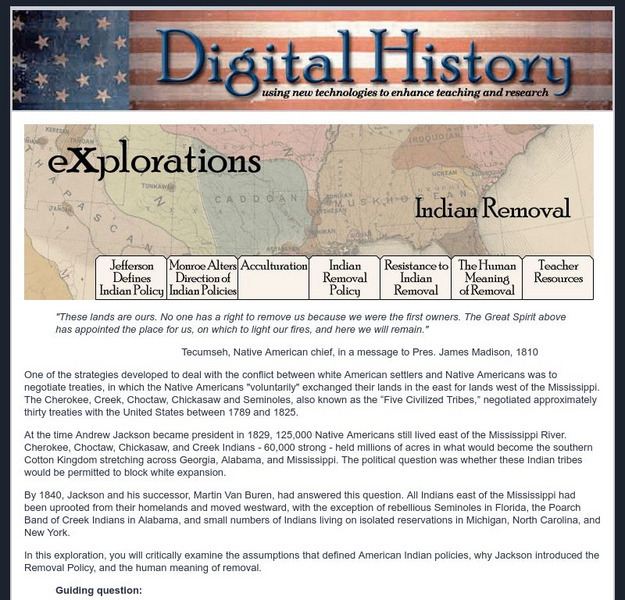
![Digital History: Problems England Faced After the French and Indian War [Pdf] Website Digital History: Problems England Faced After the French and Indian War [Pdf] Website](https://d15y2dacu3jp90.cloudfront.net/images/attachment_defaults/resource/large/FPO-knovation.png)




